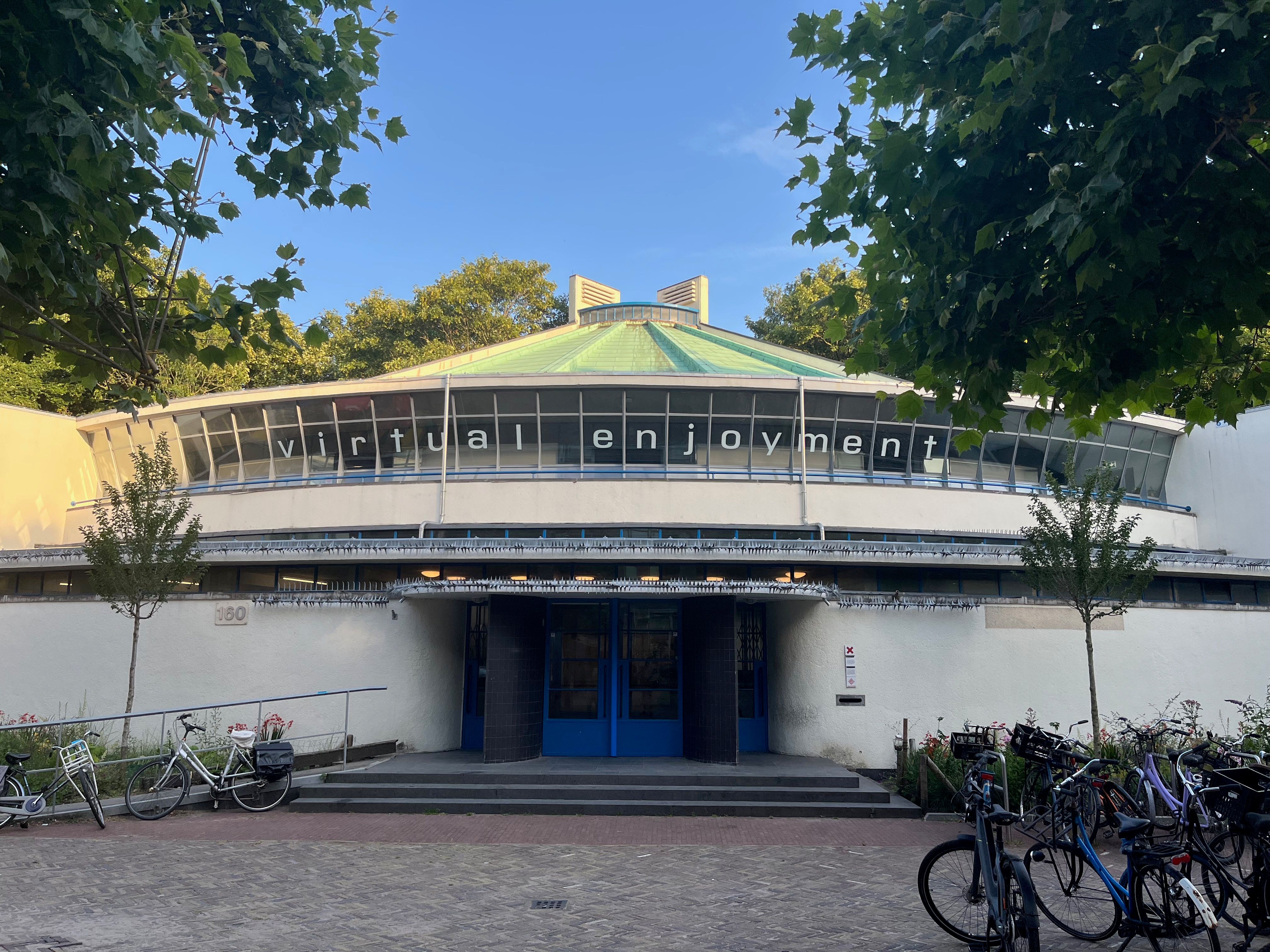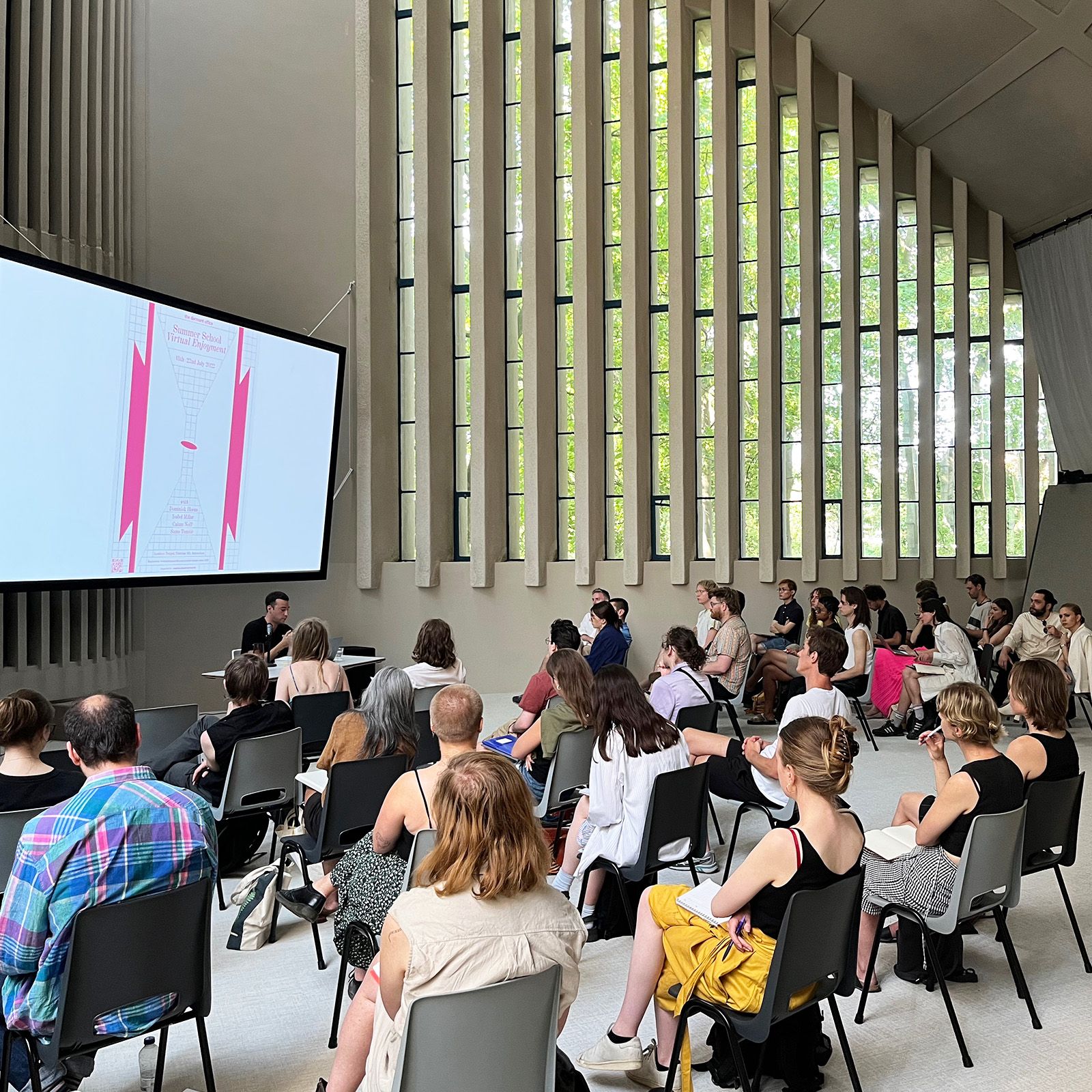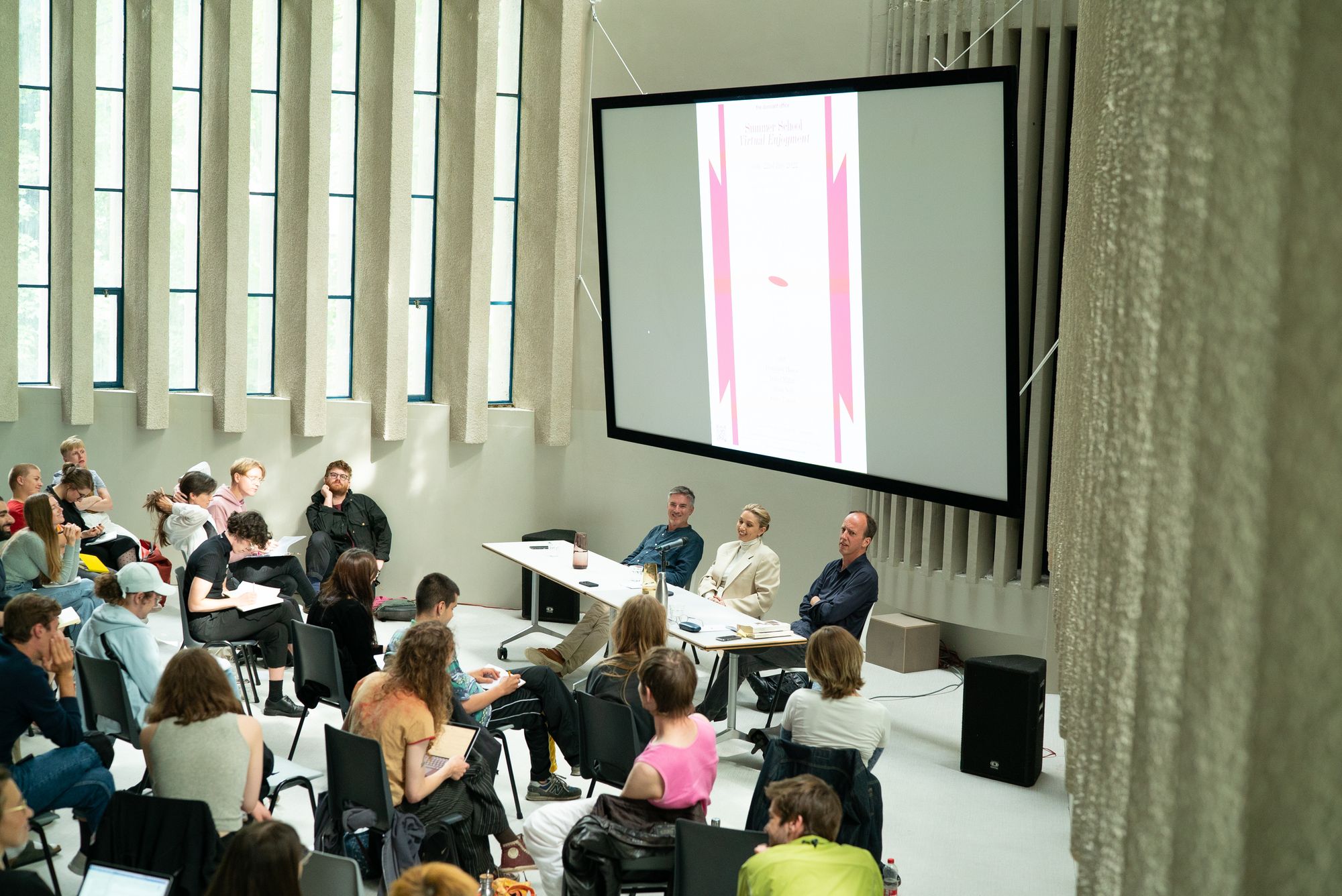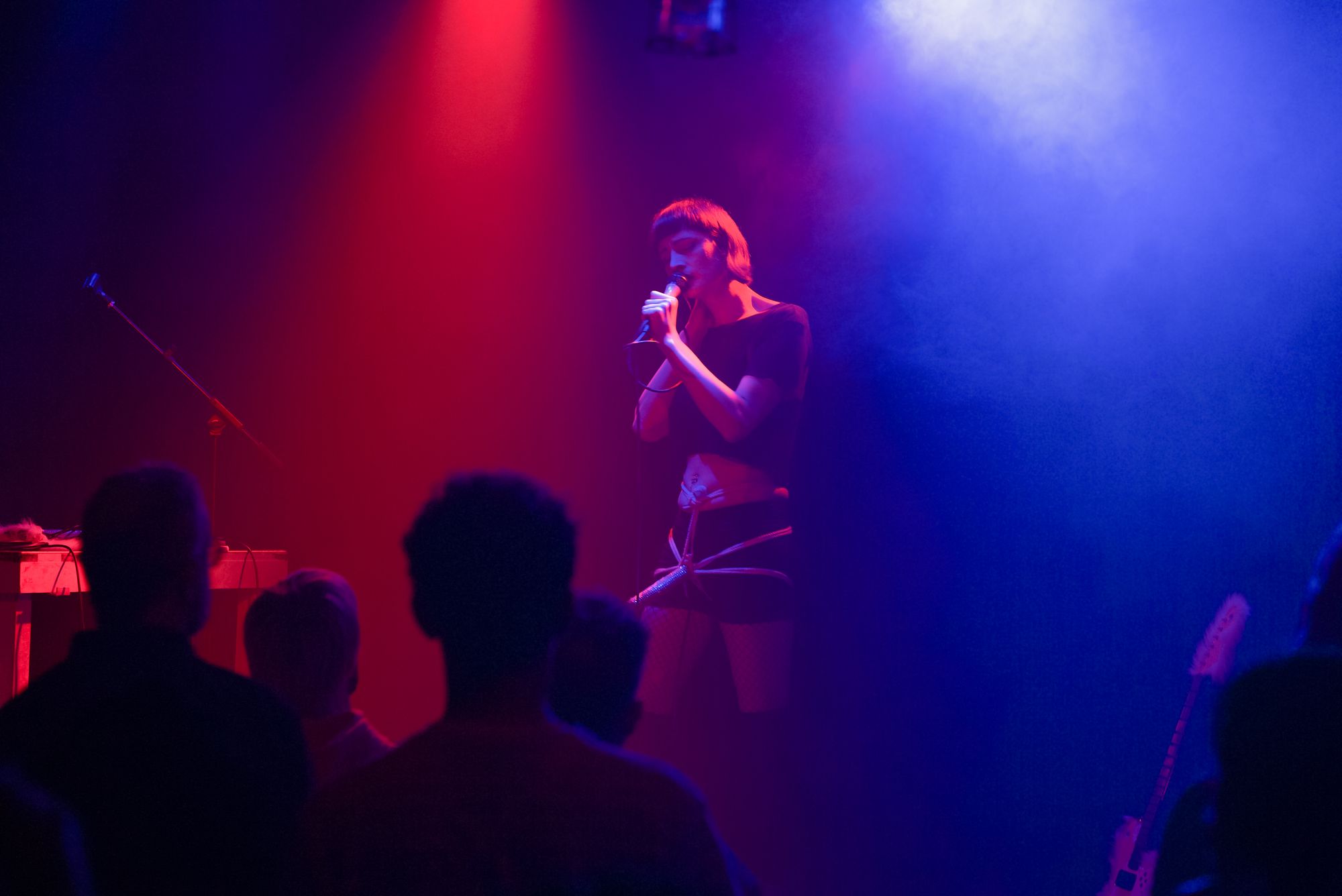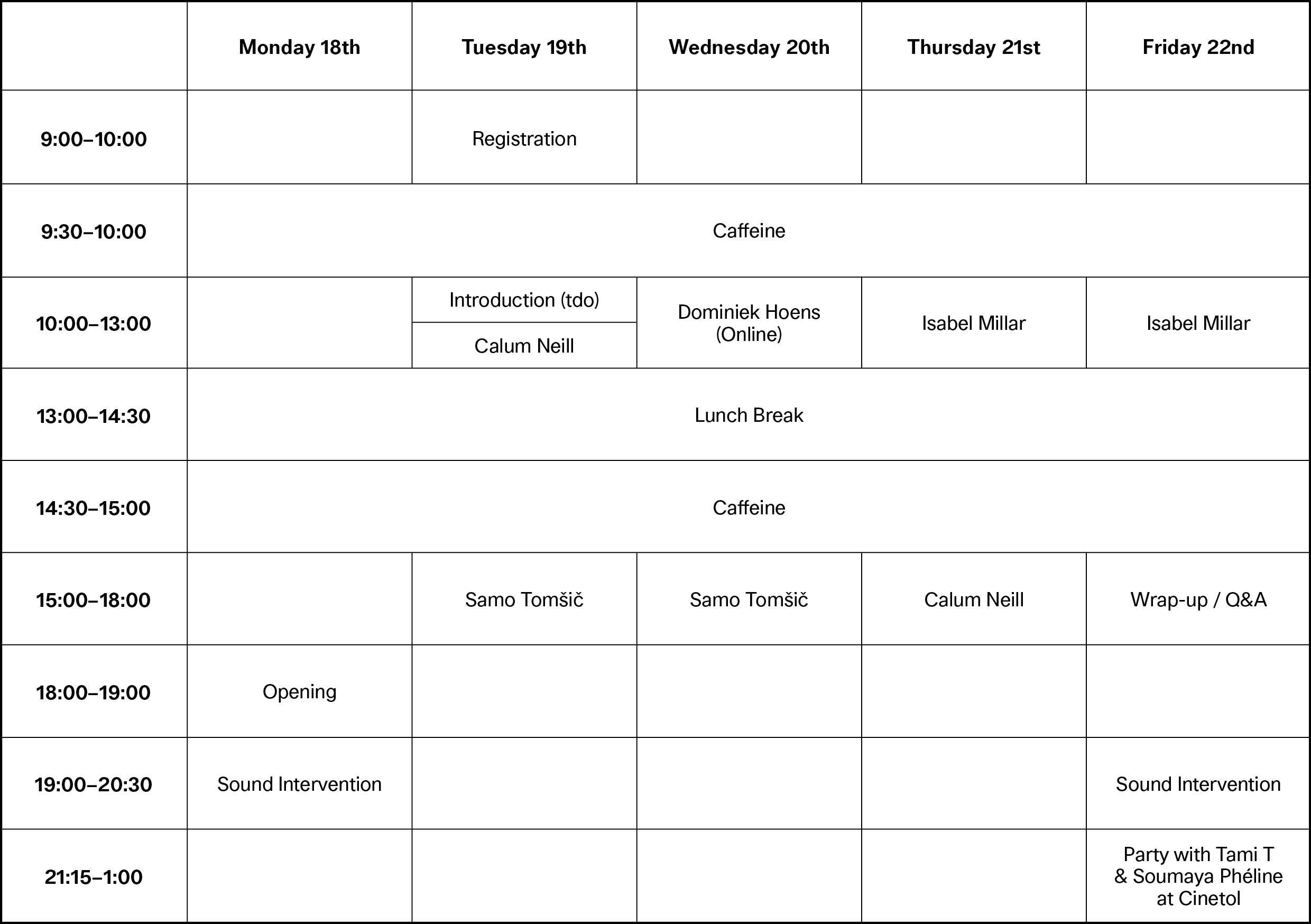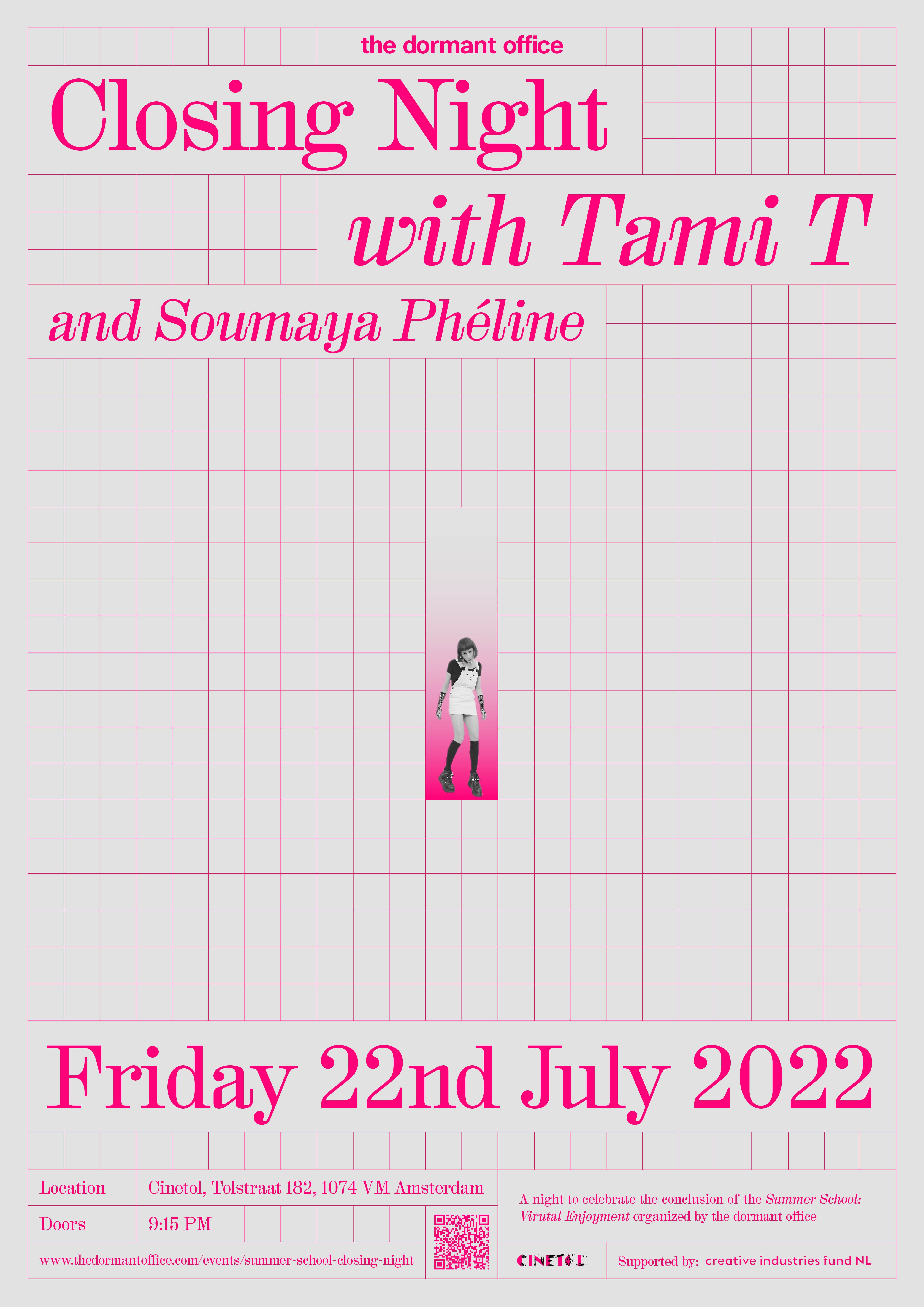- About
- Documentation
- Timetable
- Opening
- Day 1
- Day 2
- Day 3
- Day 4
- Speakers
Summer School: Virtual Enjoyment
18th–22nd July, 2022
About
the dormant office (tdo) will be hosting its first Summer School under the title Virtual Enjoyment from the 18th–22nd of July.
The Summer School will offer to local and international students and researchers a focused program of workshops, close-readings, and talks led by four renowned thinkers working at the intersection of philosophy, psychoanalysis and cultural theory: Dominiek Hoens, Isabel Millar, Calum Neill, and Samo Tomšič.
The Summer School's program will problematise the compulsive mode of enjoyment particular to (techno)capitalism, its repercussion on the speaking body, the organisation of contemporary social life, and the future. As a framework, the program will return to Lacan's foundational seminars XVI and XVII–From an Other to the other and The Other Side of Psychoanalysis– in order to elaborate on the critical perspectives they still offer for contemporary critiques of capitalism, especially in their exposition of the structural and logical relation between capitalist economy, science, and religion.
Alongside the theoretical program, the opening and closing events of the Summer School will present two artistic interventions: a sound installation reflecting on the contemporary fantasies structuring the investments in space travel (a collaboration between the singer and composer Tami T, Isabel Millar and the dormant office) and a live performance by Tami T.

Documentation
Recordings of all the lectures from the Summer School will be published here at the close of 2022. Sign up to our newsletter to be reminded.
Timetable
Opening, 18.07.2022
18:00–20:30
Opening Event
Sound Intervention
by Tami T and Isabel Millar
On the evening of the 18th of July, the Summer School will open at Broedplaats Tempel with "I'm Sorry Jeff", a 20 min sound intervention by Tami T, Isabel Millar, and the dormant office. "I'm Sorry Jeff" will also be on display at the conclusion of the Summer School, Friday 22nd at the same time.
"I’m Sorry Jeff" performs a monologue in which an AI Analyst reflects upon her encounters with analysand Jeff B during a prolonged space voyage. Jeff is a go-getter, a businessman, an entrepreneur, a worker bee, a dreamer, a lone wolf, and a man of science. That is to say, he stands for nothing other than the personification of neo-feudal masculinity leading the space travel industry.
In a theatrical score of vocalized philosophical commentaries, the piece speculates on the obscenity of Jeff's worldviews, which have drastically impacted the future of humanity, and connects them to their logical basis in instrumental masculinity and the coupling of capitalist and technoscientific discourses. Through three interventions: A Man of Science, Premature Ejaculation, and Thought and the Body, the AI analyst critiques the convergence of these discourses (and the new reality they have brought about) as a strategy to deal with the constitutive deadlock of subjectivity; that is the inexistence of the sexual relation.
Reservation is free and public via the link below.
Day 1, 19.07.2022
10:00–13:00
Introduction
Calum Neill
This introductory session will provide an overview and context for the sessions ahead. It will provide a gloss of the two seminars, Seminar XVI From an Other to the other, and Seminar XVII The Other Side of Psychoanalysis, on which we will focus over the course of our week together before moving on to consider three core aspects of the seminars. Firstly, we will map out Lacan’s key interlocutors in these two seminars, namely Pascal, Marx, Hegel, Plato, and Wittgenstein. This brief exploration of Lacan’s touchpoints will allow a framework for our later interrogation of the work of the seminars. We will then consider the emergence of the concept of surplus jouissance which Lacan begins to develop out of his reading of Marx’s Capital in Seminar XVI and continues to exploit into Seminar XVII. Finally, we will explore Lacan’s four discourses, considering the conceptual bases and value of what Lacan refers to as his quadrupedal schemas.
15:00–18:00
From Structure to Production: Lacan's Materialism
Samo Tomšič
This session will focus on Lacan’s Seminar XVI, From an Other to the other, where the controversial “homology” between Freud’s conception of pleasure (Lust) and Marx’s analysis of surplus-value is first introduced. Given the debates that this homology initiated in the recent decades, in particular, the question about its relation to the spirit of the time (May 1968), its limits, and its relation to other attempts in linking Marxism with psychoanalysis (past and contemporary) will be at the center. The main assumption of the readings and discussions will be that Lacan outlines a structuralist theory of crisis (which, perhaps somewhat paradoxically, emerges from the crisis of structuralism). For in the introductory lessons of Seminar XVI, Lacan lays the foundations not only for rethinking, and perhaps even questioning the link between structuralism and psychoanalysis, which he constructed throughout the years. He equally proposes an alternative reading of structuralism (for which it was argued at the time that it is incapable of thinking the political events of May, and more generally the dimension of event, of becoming, and of change in general).
In direct continuity with this framework, the homology between surplus-value and surplus-enjoyment will serve as an occasion to reflect on the specificities of Lacan’s materialism and on the role of “critique of epistemic economy” – of the modern accumulative and extractivist regime of knowledge – in his work. For it is quite clear that Lacan’s engagement with Marx contains an orientation in critical epistemology, which examines the intersections between modern science and capitalist production from the viewpoint of the subject. Lacan famously insisted that modern science “forecloses the subject” – and one could argue that, according to Marx, the same foreclosure characterizes the capitalist economy.
Day 2, 20.07.2022
10:00–13:00
Lacan Reads Pascal
Dominiek Hoens (online)
Evidently, Jacques Lacan's retour to Freud cannot take place without a detour via Plato, Descartes, Kant, Hegel, amongst others. However, the list of illustrious philosophers with whom Lacan entertains a dialogue also includes figures who occupy a less obvious place in Western thought. One of these figures is Blaise Pascal (1623-1664), whose famous fragment on the existence of God is repeatedly discussed in Lacan's seminar. In that pensée, it is argued that wagering on the existence of God is a reasonable act. His existence cannot be proven, but if we assume that it is possible that He exists, then after reasonable consideration, Pascal says, it is obvious that we would do well to act as if He exists.
Despite the many comments that Pascal’s wager attracted during the centuries since its publication, Lacan considers it as ‘still intact (vierge)’ and as containing something that ‘is inestimable to psychoanalysts’ (Ecrits, p. 266). Lacan’s own and – one must add – novel reading of Pascal, is documented in the transcripts of the seminars on The Object of Psychoanalysis (lessons of 2 and 9 Feb. 1966) and From an Other to the other (lessons of 15, 22, and 29 Jan.; 5 and 12 Feb. 1969). Discussing the wager, Lacan focuses not so much on the question of faith – namely, whether we should believe in the God of Christianity – but on the structure of Pascal's argument and its modernity. This modernity is not only apparent in the persistent uncertainty about the existence of God (in sharp contrast to Descartes), but also in the mathematical and ‘hedonistic’ way in which Pascal approaches the problem. What are the benefits of believing in God and what loss does it imply? This Pascalian calculus of gain and loss of enjoyment was for Lacan an occasion to ask once again how the human subject appears with a structural loss, and how this loss is accompanied by the expectation of more, or in Pascal's terms: a gambling on more.
In this lecture, we will discuss 1/ the tripartite argument of Pascal’s wager, 2/ Lacan’s game-theoretical approach to it, 3/ the status and function of object a, and 4/ the importance of Pascal’s argument to a psychoanalytically informed approach of subjectivity in capitalist times.
15:00–18:00
Renunciation of Enjoyment: Pascal and Capitalism
Samo Tomšič
Following the line of Dominiek Hoens’ session, this presentation will examine Lacan’s engagement with the relation between capitalism, science, and religion. In Seminar XVI, the “structural alliance” between Marx and Freud contains a peculiar mediating figure - Pascal, who is somewhat enigmatically labeled a “pioneer of capitalism”. This description can be explained not only through the fact that Pascal was an ingenious mathematician and technical innovator (inventing the first calculating machine). A crucial effort in Pascal’s philosophical work was dedicated to the question of conversion, the emergence of religious faith from existential doubt - the exact inversion of Descartes’ preoccupation with the emergence of scientific certainty. According to Pascal, such “change of the heart” takes place by means of compulsive repetition, which grounds religious practices. Pascal’s examination of conversion, therefore, has an essential critical value, which intersects with Freud’s accounts of the compulsive nature of enjoyment, and Marx’s exposure of the compulsive nature of capitalism. But does this mean that Pascal joins forces with psychoanalysis and critique of political economy?
Day 3, 21.07.2022
10:00–13:00
Obscenity, Technology and the Politics of Seduction
Isabel Millar
In Seminar XVII Lacan coins the strange terms lathouse (a device for siphoning-off enjoyment) and the alethosphere (a realm of truth-making). He makes reference obliquely to the notion of ‘knowledge in the real’ and the developments in technoscience which had consequences for the drive body. Examining the implications of these nascent terms in Lacan’s work, we return to his concern with the question (from Seminar XI) ‘What is a science that includes psychoanalysis? Whilst much contemporary psychoanalytic theory is quick to condemn ‘science’ broadly conceived as nothing more than the handmaiden of capitalism, this technophobia misses out the potential and necessity (if it is to remain relevant) psychoanalysis has to theorize our changing technological, corporeal and subjective conditions. The biopolitical approach to the body and science on the other hand is often understood in opposition to the psychoanalytic, given their apparently incommensurable approaches to the historicity or a-historicity of sexuality. This stark choice does not do justice however to Lacan’s abiding concern with the conceptual status of psychoanalysis and its relationship to philosophy, science and capitalism. In this session we will examine how sexuality, as Lacan is beginning to conceive it, occupies an ambiguous status between epistemology and ontology and ask how we may think about this in the context of advances in Artificial Intelligence, neuroscience and biotechnology, realms which bring the concepts of the lathouse and alethosphere vividly into the purview of contemporary thought.
15:00–18:00
Close Reading
Calum Neill
This session will provide an opportunity to explore two chapters from Lacan’s Seminar XVII. The primary aim of the session is to engage collectively in a slow reading of the seminar working together to disentangle and shine some light on Lacan’s developing discourse. It should be kept in mind that Lacan’s seminars were unscripted, but not unprepared, which is to say that the seminar is itself an informed exploration. Towards the end of the seminar, Lacan explicitly makes the point that there is something here, in the context of this exploration, that “prevents us from concluding” (173). Our slow reading will respect this point and will seek to open up, rather than close down, the text.
The chapters upon which we will focus – chapters VII and XI - each concern the place and functioning of science, articulating our understanding of science as a societal phenomenon to notions of curated knowledge, mastery, identity, and the unary trait.
Day 4, 22.07.2022
10:00–13:00
Obscenity, Technology and the Politics of Seduction
Isabel Millar
Life is pornographic, everything is obscene and there is no longer anything left to secrecy. These were some of Jean Baudrillard’s bold ideas in his last work about the final stage of hyperreality and simulation into which we had entered. Drawing on Lacan, Baudrillard famously took the concept of sexuality and its relation to the discourse of the Enlightenment further into the realms of hyperreality, suggesting that sex is itself a simulation, an attempt to replicate an originary lost jouissance that was never really there in the first place. The inexistence of the sexual relation is the foundational concept of Lacanian psychoanalysis. Each subject only ever experiencing sexuality as mediated through a fantasy structure in which they may take up any position in relation to the object. But where (according to Baudrillard) for psychoanalysis there remains the possibility of a ‘non-relation’, giving rise to various forms of jouissance, even the power of this failed sexual rapport is diminishing as the world becomes more transparent, along with the progressive abstraction of sexual exchange value, and the dissolution of desire replaced by something more akin to compulsion and automatic mimesis. In this session, we will explore through Lacan, Baudrillard, Lyotard, Foucault, Adorno, Steigler and others, the dialectic of technology and ontology and how the notion of seduction, as Baudrillard conceives it, offers us a way of understanding the production of reality and a retreat from the obscenity of the ‘fully operational’ technocapitalist world.
15:00–18:00
Concluding Session with speakers and Q&A
19:00–20:30
Sound Intervention
by Tami T and Isabel Millar
On the evening of the 22nd of July "I'm Sorry Jeff"—a sound intervention by Tami T, Isabel Millar and the dormant office—is activated for the second and final time. Reservation is free and public via the link below.
21:15–01:00
Closing Night
with Tami T and Soumaya Phéline
Party! On Friday the 22nd of July, the Summer School concludes with a live performance by Tami T and a DJ set by Soumaya Phéline at Cinetol. The event is open to the public and not only to registered participants of the Summer School.
About Tami T
Tami T is a musician and producer who regularly tours Europe's nightclubs with her dance friendly electronic pop and self-built instruments. She released her first album High Pitched and Moist in 2019 in which she explores themes related to love, sexuality and queer identity through raw and honest lyrics. Tami has collaborated with Fever Ray and Gnučči, among others, as well as composed music for various films, theater and dance performances.
Listen to Tami T's Spotify here
About Soumaya Phéline
Soumaya Phéline is a Brussels-based DJ, promoter, local active figure since 2006, Kiosk radio host, and member of the Psst Mlle & Club Détour collectives. Soumaya Phéline isn’t here to make crowds feel comfortable. Instead, she constantly toys with dance floor expectations by drawing from various electronic sub-genres – never quite giving you the kick, climax or gulp of air you thought you needed or asked for. Heavy with bass, breaks, mesmerizing melodies and rhythmic vocals, Soumaya’s sets distort and disturb in a way that’s strangely satisfying.
Listen to Soumaya Phéline's Soundcloud here
Practical Info
Date | Friday 22 July
Doors | 21:15
Tickets | excl. btw: €12 (early bird) €15 (regular ticket) €20 (support ticket)
Location | Cinetol, Tolstraat 182, 1074 VM Amsterdam
Speakers
Dominiek Hoens teaches philosophy at RITCS (Brussels), where he also does research under the heading of ‘Capital owes you nothing’. Recent publications include an edited collection on Marguerite Duras, chapters on Jacques Lacan in Handbook of Psychoanalytic Political Theory (Routledge, 2020), Reading Lacan’s Ecrits (Routledge, 2022) and The Marx Through Lacan Vocabulary (Routledge, 2022), and several articles on Blaise Pascal.
Isabel Millar is a philosopher and psychoanalytic theorist from London. She received her PhD from Kingston University, School of Art in 2021. Her work focuses on AI, sex, the body, film and the future. Her first book The Psychoanalysis of Artificial Intelligence was published with the Palgrave Lacan Series in 2021. She is a research fellow at The Centre for Critical Thought, the University of Kent and affiliate faculty of The Global Centre for Advanced Studies, Institute of Psychoanalysis. She is currently working on her next book Patipolitics: On the Government of Sexual Suffering for Bloomsbury Philosophy.
Calum Neill is Associate Professor of Psychoanalysis and Cultural Theory at Edinburgh Napier University and Director of Lacan in Scotland. He is the author of Without Ground: Lacanian Ethics and the Assumption of Subjectivity (Palgrave, 2014), Ethics and Psychology: Beyond Codes of Practice (Routledge, 2016) and Jacques Lacan: the Basics (Routledge, 2023). He is co-editor of the Palgrave Lacan Series and the Reading Lacan’s Écrits four volume collection. He also wrote the well-known paper ‘Breaking the Text: An Introduction to Lacanian Discourse Analysis’ (Theory and Psychology, Vol.23, Iss.3) which provides a potentially useful overview of the four discourses.
Samo Tomšič is visiting professor of philosophy at the University of Fine Arts Hamburg and research associate at the Humboldt University Berlin. He obtained his PhD from University of Ljubljana, Slovenia. His research areas comprise political philosophy, history and theory of psychoanalysis, continental philosophy and epistemology. Recent publications include The Capitalist Unconscious: Marx and Lacan (Verso, 2015) and The Labour of Enjoyment. Toward a Critique of Libidinal Economy (August Verlag, 2019/2021).
